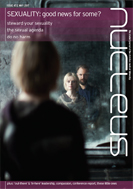You've almost certainly been lectured on child protection: warning signs and reporting procedures. Our textbooks usually stop after social services are called; well-trained professionals and a care system take over. In a low-resource setting, social services may not exist, with large children's homes the only care options.
In the West, the child's welfare is the obvious top priority; outside it's often the family's wellbeing and survival. The problem is clearest with sexual abuse. In the UK, any mother whose child accuses a relative is morally right to call the police. The shame and repercussions on the adults around them are necessary evils, what matters is protecting the vulnerable, innocent child.
In a low-resource setting, it's a lot more complex.With no welfare systems, social shame can threaten a family's physical survival. In the UK, our society focuses on guilt: what matters is that what you've done is bad. You might feel shame at something done to you, or by your family but support groups and professionals seek to help you past that.Society in much of the world focuses on shame that can attach to a victim and a family.
So imagine a mother whose child discloses incest. In some low-resource settings, the mother's greatest fear will be others finding out. This can be intensely realistic. If others know then the whole family is shamed. Not only will no one marry this girl, but the whole extended family's prospects will suffer. This isn't only in marriage, in a society where jobs come through personal connections,who'd give them to someone from a family who've been shamed? Suddenly it's the child who threatens the family's survival, not an abuser who can be trusted to keep quiet.
Now suppose you're the one who's diagnosed an STI in a child. If the family can't or won't protect them, do you have anything better to offer? Maybe a nearby NGO runs a home, but what happens to the young people when they leave? Society works around family units, they're how you access relationships, food, jobs and marriage. With no social welfare, a girl without a family may have limited chances: a boy only slightly better.
so what do you do?
Get senior help. These situations need it regardless of the setting. Talk to long-term and local staff: they'll know the likely pitfalls, and any local child protection services and NGOs. In some areas, you need to consider the risk of an honour killing, in others, police involvement may endanger the child.
Where there's no child protection services,sometimes the medical team you work with will be comfortable calling in the family and discussing howto keep the child safe. Maybe there's a locally respected NGO whose involvement doesn't bring stigma. In the worst case scenarios, sometimes all you can do is to find a supportive adult, ask them to build a relationship with the child, pray for them and keep telling them that the abuse is not their fault.
helpful resources
- International Rescue Committee. Caring for Child Survivors of Sexual Abuse: Guiding Principles and Key Issues. UNICEF; 2012:87-104 uni.cf/2p2ErTY
- Eapen V et al. Where there is no child psychiatrist: a mental healthcare manual. Glasgow, RCPsych Publications; 2012































